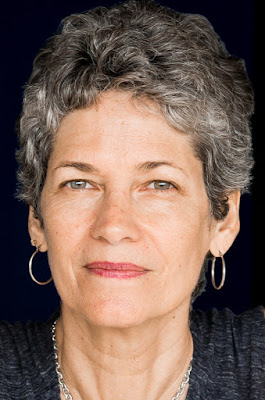‘Inspired by the Archives’ panel chaired by Kei Miller, with Anu Lakhan,
Breanne Mc Ivor, Andre Bagoo and K. Miller (left to right)
Caribbean Literary Heritage (CLH) is a Leverhulme-funded research project that focuses on raising awareness about the importance of Caribbean literary legacies and their preservation, as well as generating and promoting research on literary archives, author’s record keeping practices and fuller literary histories. Led by Professor Alison Donnell and award-winning Jamaican author and Professor Kei Miller, this three-year long project will explore these issues from a variety of angles with the objective of connecting the past and present of Caribbean literature in thinking about future long-term preservation.
At Bocas Lit Fest, where CLH collaborated with the festival around the theme of literary heritage, Alison Donnell explained how this project had been in her mind for a long time. Introducing ‘Secret Lives: Why Literary Archives Matter’, one of the panels she chaired at the festival, Donnell pointed out: "Sometimes I find the name of a woman writer [in the archives] but no work, sometimes I find the work but nothing about her, so it had always been my dream to be able to have a project that could look seriously at this.”
‘Secret Lives: Why Literary Archives Matter’, from left to right:
Evelyn O’Callaghan,
Kei Miller, Alison Donnell and Shara McCallum.
Kei Miller, Caribbean literary scholar Evelyn O’Callaghan and poet Shara McCallum joined Donnell on this panel at Bocas Lit Fest. In reflecting about the role of archives, Miller talked about how the eloquence of Alexander Bustmante’s letters challenges popular portrayals and myths about him, adding the poignant question: “How do the archives counter-stories”?
As stated in the project’s website, Caribbean Literary Heritage is concerned with the Caribbean’s literary past and the region’s tangible and intangible literary heritage. It is particularly interested in neglected writers and writings at risk of being lost, and in thinking about what influences such precarity. At present, there is no established platform to access the location and scope of authors’ papers, including many scattered and undocumented sources. The literary histories that researchers and students can access are often incomplete and privilege male writers, as well as those who migrated and published with presses in the global north. This project wants to enable fuller literary histories to be told and their sources to be known, preserved and made accessible.
The main aims of the project are:
• to create a fuller literary history of the period 1940-1980
• to recover stories of forgotten writers and writings
• to help writers save today’s manuscripts and papers for tomorrow’s researchers
• to bring together academics, archivists and writers to discuss the changing nature of Caribbean literary archives across the twentieth and twenty-first centuries
Part of the team Caribbean Literary Heritage at Bocas Lit Fest.
From left to right: Zakiya McKenzie, Jennifer McDerra, Alison Donnell and Kei Miller.
You can check out this link to find out more about the project’s team members:
https://www.caribbeanliteraryheritage.com/people/
The project’s blog publishes stories and reflections around literary archives and research from a variety of perspectives and experiences: those of writers, researchers, librarians and archivists. It aims to be a space for dialogue, sharing and collaboration and we invite those interested to contribute by getting in touch with us via our site’s contact form or email address (www.caribbeanlitheritage@gmail.com)
The partnership between CLH and Bocas Lit Fest also resulted in the commission of three Trinidadian writers: Andre Bagoo, Anu Lakhan, and Breanne McIvor visiting and responding to a variety of local archives at the Alma Jordan Library, UWI St. Augustine. They shared powerful creative writing inspired by that experience in a Bocas Lit Fest event chaired by Kei Miller and wrote three engaging pieces for our blog. You can enjoy them, and all our other blog posts here: https://www.caribbeanliteraryheritage.com/blog/
There is also a section entitled 10 Questions on Caribbean Literary Heritage in which Caribbean writers discuss their first piece of writing, their first and current readings, and their interest in the literary past.
https://www.caribbeanliteraryheritage.com/ten-questions/
Zakiya McKenzie interviewing Breanne Mc Ivor at Bocas Lit Fest
We would like to share our call to Caribbean writers and those of Caribbean descent. Please check out and fill in our author questionnaire about your own working papers and recording practices. We are very interested in hearing writers’ views!
https://www.caribbeanliteraryheritage.com/writers-survey/
***
You can follow us on Twitter: @CaribLiteraryH, Facebook: Caribbean Literary Heritage, and Instagram: caribliteraryh
(!) TUNE IN on Twitter and FB for International Archives Day, this Saturday 9th June!! Follow our links as we celebrate archives, and tell us about your experiences and best memories in the archives using the #CaribbeanLitHeritage and #InternationalArchivesDay















